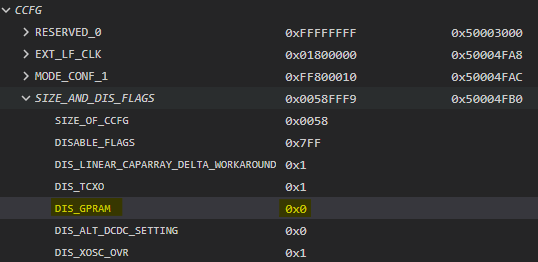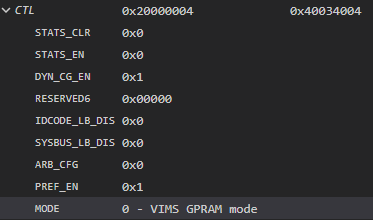Other Parts Discussed in Thread: SYSCONFIG
Hi,
Our application is tailored around the multirole application from TI simplelink BLE SDK v7.10.2.23.
I want to reconfigure the cache as GPRAM for the CC2651R3 in order to free some SRAM.
I have followed the necessary and can see the configured GPRAM section in the memory allocation window. However, I can not assign the multirole task stack buffer to the GPRAM block.
static __attribute__((section( ".TaskStacks"))) uint8_t mrTaskStack[MR_TASK_STACK_SIZE];
In case I do this, the application boots up successfully after cold reset (mass erase and boot up for first) and advertises as expected. For all subsequent warm resets, the application does not boot up, essentially I see no advertisement.
I attach the linker command file for your reference and the .map file.
/*******************************************************************************
* CCS Linker configuration
*/
/* Retain interrupt vector table variable */
--retain=g_pfnVectors
/* Override default entry point. */
--entry_point ResetISR
/* Suppress warnings and errors: */
/* - 10063: Warning about entry point not being _c_int00 */
/* - 16011, 16012: 8-byte alignment errors. Observed when linking in object */
/* files compiled using Keil (ARM compiler) */
--diag_suppress=10063,16011,16012
/* The following command line options are set as part of the CCS project. */
/* If you are building using the command line, or for some reason want to */
/* define them here, you can uncomment and modify these lines as needed. */
/* If you are using CCS for building, it is probably better to make any such */
/* modifications in your CCS project and leave this file alone. */
/* */
/* --heap_size=0 */
--stack_size=1024
/* --library=rtsv7M3_T_le_eabi.lib */
/* The starting address of the application. Normally the interrupt vectors */
/* must be located at the beginning of the application. Flash is 128KB, with */
/* sector length of 4KB */
/*******************************************************************************
* Memory Sizes
*/
#define FLASH_BASE 0x00000000
#define GPRAM_BASE 0x11000000
#define RAM_BASE 0x20000000
#define FLASH_SIZE 0x00058000
#define GPRAM_SIZE 0x00002000
#define RAM_SIZE 0x00008000
#define RTOS_RAM_SIZE 0x0000012C
/*******************************************************************************
* Memory Definitions
******************************************************************************/
/*******************************************************************************
* RAM
*/
#define RAM_START RAM_BASE
#ifdef ICALL_RAM0_START
#define RAM_END (ICALL_RAM0_START - 1)
#else
#define RAM_END (RAM_BASE + RAM_SIZE - 1)
#endif /* ICALL_RAM0_START */
/* For ROM 2 devices, the following section needs to be allocated and reserved */
#define RTOS_RAM_START RAM_BASE
#define RTOS_RAM_END (RAM_BASE + RTOS_RAM_SIZE - 1)
/*******************************************************************************
* Flash
*/
#define FLASH_START FLASH_BASE
#define WORD_SIZE 4
#define PAGE_SIZE 0x2000
#ifdef PAGE_ALIGN
#define FLASH_MEM_ALIGN PAGE_SIZE
#else
#define FLASH_MEM_ALIGN WORD_SIZE
#endif /* PAGE_ALIGN */
#define PAGE_MASK 0xFFFFE000
/* The last Flash page is reserved for the application. */
#define NUM_RESERVED_FLASH_PAGES 1
#define RESERVED_FLASH_SIZE (NUM_RESERVED_FLASH_PAGES * PAGE_SIZE)
/* Check if page alingment with the Stack image is required. If so, do not link
* into a page shared by the Stack.
*/
#ifdef ICALL_STACK0_START
#ifdef PAGE_ALIGN
#define ADJ_ICALL_STACK0_START (ICALL_STACK0_START * PAGE_MASK)
#else
#define ADJ_ICALL_STACK0_START ICALL_STACK0_START
#endif /* PAGE_ALIGN */
#define FLASH_END (ADJ_ICALL_STACK0_START - 1)
#else
#define FLASH_END (FLASH_BASE + FLASH_SIZE - RESERVED_FLASH_SIZE - 1)
#endif /* ICALL_STACK0_START */
#define FLASH_LAST_PAGE_START (FLASH_SIZE - PAGE_SIZE)
/*******************************************************************************
* Stack
*/
/* Create global constant that points to top of stack */
/* CCS: Change stack size under Project Properties */
__STACK_TOP = __stack + __STACK_SIZE;
/*******************************************************************************
* GPRAM
*/
#ifdef CACHE_AS_RAM
#define GPRAM_START GPRAM_BASE
#define GPRAM_END (GPRAM_START + GPRAM_SIZE - 1)
#endif /* CACHE_AS_RAM */
/*******************************************************************************
* ROV
* These symbols are used by ROV2 to extend the valid memory regions on device.
* Without these defines, ROV will encounter a Java exception when using an
* autosized heap. This is a posted workaround for a known limitation of
* RTSC/rta. See: bugs.eclipse.org/.../show_bug.cgi
*
* Note: these do not affect placement in RAM or FLASH, they are only used
* by ROV2, see the BLE Stack User's Guide for more info on a workaround
* for ROV Classic
*
*/
__UNUSED_SRAM_start__ = RAM_BASE;
__UNUSED_SRAM_end__ = RAM_BASE + RAM_SIZE;
__UNUSED_FLASH_start__ = FLASH_BASE;
__UNUSED_FLASH_end__ = FLASH_BASE + FLASH_SIZE;
/*******************************************************************************
* Main arguments
*/
/* Allow main() to take args */
/* --args 0x8 */
/*******************************************************************************
* System Memory Map
******************************************************************************/
MEMORY
{
/* EDITOR'S NOTE:
* the FLASH and SRAM lengths can be changed by defining
* ICALL_STACK0_START or ICALL_RAM0_START in
* Properties->ARM Linker->Advanced Options->Command File Preprocessing.
*/
/* Application stored in and executes from internal flash */
FLASH (RX) : origin = FLASH_START, length = (FLASH_END - FLASH_START + 1)
/* CCFG Page, contains .ccfg code section and some application code. */
FLASH_LAST_PAGE (RX) : origin = FLASH_LAST_PAGE_START, length = PAGE_SIZE
/* Application uses internal RAM for data */
#if (defined(FLASH_ROM_BUILD) && (FLASH_ROM_BUILD == 2))
RTOS_SRAM (RWX) : origin = RTOS_RAM_START, length = (RTOS_RAM_END - RTOS_RAM_START + 1)
#endif
SRAM (RWX) : origin = RAM_START, length = (RAM_END - RAM_START + 1)
#ifdef CACHE_AS_RAM
GPRAM(RWX) : origin = GPRAM_START, length = GPRAM_SIZE
#endif /* CACHE_AS_RAM */
}
/*******************************************************************************
* Section Allocation in Memory
******************************************************************************/
SECTIONS
{
.intvecs : > FLASH_START
.text : >> FLASH | FLASH_LAST_PAGE
.const : >> FLASH | FLASH_LAST_PAGE
.constdata : >> FLASH | FLASH_LAST_PAGE
.rodata : >> FLASH | FLASH_LAST_PAGE
.cinit : > FLASH | FLASH_LAST_PAGE
.pinit : >> FLASH | FLASH_LAST_PAGE
.init_array : > FLASH | FLASH_LAST_PAGE
.emb_text : >> FLASH | FLASH_LAST_PAGE
.ccfg : > FLASH_LAST_PAGE (HIGH)
GROUP > SRAM
{
.data
.bss
.vtable
.vtable_ram
vtable_ram
.sysmem
.nonretenvar
/*This keeps ll.o objects out of GPRAM, if no ll.o would be placed here
the warning #10068 is supressed.*/
#ifdef CACHE_AS_RAM
ll_bss
{
--library=*ll_*.a<ll.o> (.bss)
--library=*ll_*.a<ll_ae.o> (.bss)
}
#endif /* CACHE_AS_RAM */
.ramVecs
} LOAD_END(heapStart)
.stack : > SRAM (HIGH) LOAD_START(heapEnd)
.TaskStacks : > GPRAM
}
--symbol_map __TI_STACK_SIZE=__STACK_SIZE
--symbol_map __TI_STACK_BASE=__stack
-u_c_int00
--retain "*(.resetVecs)"
--retain "*(.vecs)"
SECTIONS
{
.resetVecs: load > 0
.vecs: load > 0x20000000, type = NOLOAD
}
How do I resolve this?















